| Listing 1 - 10 of 28 | << page >> |
Sort by
|
Book
Abstract | Keywords | Export | Availability | Bookmark
 Loading...
Loading...Choose an application
- Reference Manager
- EndNote
- RefWorks (Direct export to RefWorks)
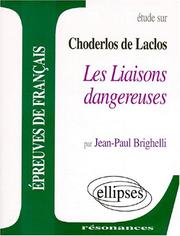
ISBN: 9782729858872 2729858873 Year: 1998 Publisher: Paris: Ellipses,
Abstract | Keywords | Export | Availability | Bookmark
 Loading...
Loading...Choose an application
- Reference Manager
- EndNote
- RefWorks (Direct export to RefWorks)
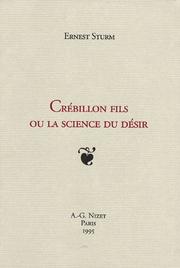
ISBN: 2707812102 9782707812100 Year: 1995 Publisher: Paris Nizet
Abstract | Keywords | Export | Availability | Bookmark
 Loading...
Loading...Choose an application
- Reference Manager
- EndNote
- RefWorks (Direct export to RefWorks)
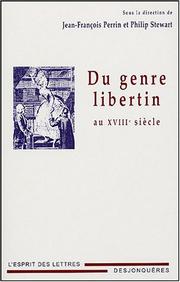
ISBN: 9782843210716 2843210712 Year: 2004 Publisher: Paris : Desjonquères,
Abstract | Keywords | Export | Availability | Bookmark
 Loading...
Loading...Choose an application
- Reference Manager
- EndNote
- RefWorks (Direct export to RefWorks)
French literature --- Libertines in literature. --- Libertinism in literature. --- Literatura europea --- Historia y crítica
Book
Year: 1970 Publisher: Paris : A.G. Nizet,
Abstract | Keywords | Export | Availability | Bookmark
 Loading...
Loading...Choose an application
- Reference Manager
- EndNote
- RefWorks (Direct export to RefWorks)
Book
ISBN: 3825309193 Year: 1999 Publisher: Heidelberg : Universitätsverlag C. Winter,
Abstract | Keywords | Export | Availability | Bookmark
 Loading...
Loading...Choose an application
- Reference Manager
- EndNote
- RefWorks (Direct export to RefWorks)
Libertines in literature --- English literature --- Libertins dans la littérature --- Littérature anglaise --- History and criticism --- Histoire et critique
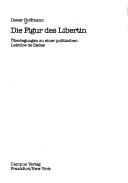
ISBN: 3593333376 Year: 1984 Publisher: Frankfurt Campus
Abstract | Keywords | Export | Availability | Bookmark
 Loading...
Loading...Choose an application
- Reference Manager
- EndNote
- RefWorks (Direct export to RefWorks)
Libertines in literature --- Political fiction, French --- Politics and literature --- History and criticism --- History --- Sade, --- Political and social views.
Book
ISBN: 9781644533239 9781644533246 Year: 2024 Publisher: Newark University of Delaware Press
Abstract | Keywords | Export | Availability | Bookmark
 Loading...
Loading...Choose an application
- Reference Manager
- EndNote
- RefWorks (Direct export to RefWorks)
"Out of the libertine literary tradition of eighteenth-century France emerged over a dozen memoir novels of female libertines who eagerly take up sex work as a means of escape from the patriarchal control of fathers and husbands to pursue pleasure, wealth, and personal independence outside the private, domestic sphere. In these anonymously published novels, the heroines proudly declare themselves prostitutes, or putains, and use the desire they arouse, the professional skills they develop, and the network of female friends they create to exploit, humiliate, and financially ruin wealthy and powerful men. In pursuing their desires, the putains challenge contemporary notions of womanhood and expose the injustices of ancien-régime France. Until the French Revolution spelled the end of the genre, these novels proposed not only an appealing libertine utopia in which libertine women enjoy the same benefits as their male counterparts, but also entirely new ways of looking at systems of power, gender, and sexuality"--
Autobiographical fiction, French --- French fiction --- Prostitutes in literature --- Libertines in literature --- Women in literature --- History and criticism
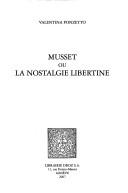
ISBN: 9782600011273 2600011277 Year: 2007 Volume: 433 Publisher: Genève : Droz,
Abstract | Keywords | Export | Availability | Bookmark
 Loading...
Loading...Choose an application
- Reference Manager
- EndNote
- RefWorks (Direct export to RefWorks)
L’élégance insolente et la sensualité du XVIIIe siècle rajeunissent sous sa plume, rehaussées par une touche de poésie toute personnelle. Son oeuvre en retire une grande liberté de pensée et de langage, comme un léger parfum de scandale. Musset joue en virtuose des sous-entendus du discours libertin puisant dans un riche intertexte qui va de Marivaux à Louvet de Couvray, en passant par Crébillon fils et Laclos. Il en retient notamment l’art de jouer avec le lecteur, en vue d’établir avec lui un rapport tout à la fois de complicité et de défi. Pris dans les chassés-croisés de la séduction et du retrait, de l’aveu et du déni, ce discours postule l’ambivalence entre cynisme et sentimentalisme. Il suggère une secrète parenté entre double sens libertin et ironie romantique. Ainsi, de la reprise au dépassement du modèle hérité du siècle des Lumières, l’oeuvre de Musset trouve la voie de son originalité et de son charme.
Book
ISBN: 1283270714 9786613270719 9004211209 9789004211209 9781283270717 9789004211193 9004211195 Year: 2011 Publisher: Leiden Boston Brill
Abstract | Keywords | Export | Availability | Bookmark
 Loading...
Loading...Choose an application
- Reference Manager
- EndNote
- RefWorks (Direct export to RefWorks)
Much of the previous scholarship on Russia's literary discourses of sexuality and eroticism in the Silver Age was built on applying European theoretical models (from psychoanalysis to feminist theory) to Russia's modernization. This book argues that, at the turn into the twentieth century, Russian popular culture for the first time found itself in direct confrontation with the traditional high cultures of the upper classes and intelligentsia, producing modernized representations of sexuality. This Russian tradition of conflicted representations, heretofore misassessed by literary history, emerges as what Foucault would call a full-blown “bio-history” of Russian culture: a history of indigenous representations of sexuality and the eroticized body capable of innovation on its own terms, not just those derivative from Europe.
| Listing 1 - 10 of 28 | << page >> |
Sort by
|

 Search
Search Feedback
Feedback About UniCat
About UniCat  Help
Help News
News